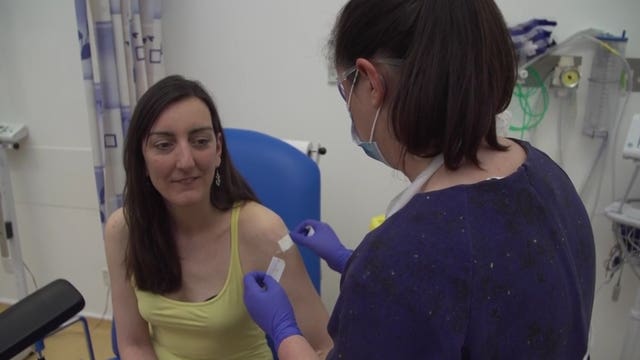Shutdown measures could delay data gathering for Covid-19 vaccine
It could be months before volunteers in clinical trials are exposed to coronavirus in the community due to the success of social distancing.

The success of the Government’s shutdown measures to curb the spread of Covid-19 may hamper the process of gathering data to develop a vaccine, a scientist leading clinical trials has said.
Volunteers cannot be deliberately exposed to the virus due to the risk to their lives, meaning scientists have to wait until they encounter it in the community to record the results.
Professor Andrew Pollard, director of the Oxford Vaccine Group, said: “Of course there isn’t very much virus around in the community at the moment – the lockdown has had a big impact on transmission.
“So it is difficult to predict exactly when they will meet the virus and it may be some months before that happens.”

Speaking on BBC Breakfast, Prof Pollard said because so little is known about Covid-19, scientists could not deliberately expose the volunteers to the virus.
“You are potentially putting those people at risk and we know people who have had large exposure to the virus, some have become extremely unwell – including some young people,” he said.
“At this moment we don’t have a treatment for coronavirus so we would have to do this extremely carefully.”
Unlike other diseases, there is not yet a “human model” for Covid-19, meaning scientists do not know what is a safe dose to give volunteers in vaccine trials.
Medics say that as with other viruses, the level of exposure a patient has to the virus can also dictate how severely they are affected.
“For example if you gave a much bigger dose to the people in the control group and they all got the disease and a much lower dose to the people in the group with the vaccine, you could make your vaccine look very good without it actually working.”
He said it would be many months before every stage of clinical trials has been completed, and then another huge task to scale up production to manufacture the volume of doses required to give herd immunity.
Speaking on Radio 4’s Today programme, Health Secretary Matt Hancock acknowledged the lockdown’s impact on the gathering of vaccine data.
But he said letting “the virus rip in order to test the vaccine” was not an approach that anybody would recommend.
Prof Chris Whitty, the chief medical officer, has also warned against the public pinning their hopes on a vaccine to lift the lockdown any time soon.
Speaking at the Downing Street press conference on Wednesday, he said the prospect of having a vaccine or an effective treatment in the next calendar year were “incredibly small”.
“I think we should be realistic about that, we’re going to have to rely on other social measures, which of course are very socially disruptive as everyone is finding at the moment,” he said.





